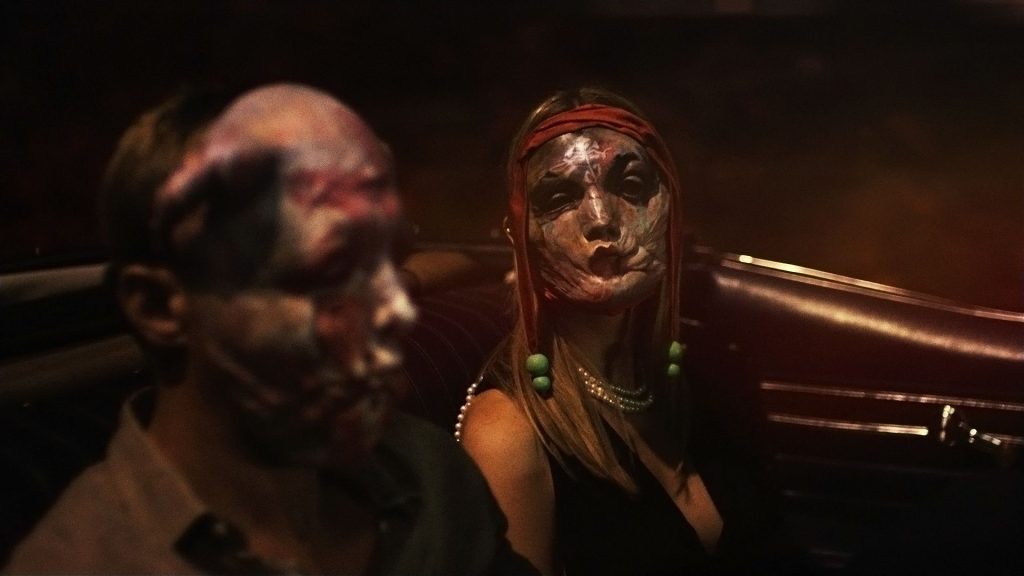Reviews include M3GAN 2.0, Familiar Touch, and I’m Your Venus.
TFCA Friday: Week of Jan. 27
January 27, 2023

Welcome to TFCA Friday, a weekly round-up of film reviews and articles by TFCA members.
The TFCA is saddened to learn of the passing of former TIFF co-director and artistic director of TIFF Bell Lightbox Noah Cowan. Barry Hertz and Peter Howell report on the news at The Globe and Mail and the Toronto Star, respectively.
ICYMI: The deadline approaches for the Emerging Critic Prize. Apply by Jan. 29 at 6:00 PM!
In Release this Week
Blood (dir. Brad Anderson 🇨🇦)
“[A]n uninspired and bland thriller/horror that fails to incite any scares or thrills,” sighs Gilbert Seah at Afro Toronto.
Condor’s Nest (dir. Phil Blattenberger)
“Despite the messiness of the story, the film is still intriguing enough in its preposterousness that it makes entertaining viewing,” says Gilbert Seah at Afro Toronto.
Exceptional Beings (dir. Njedeh Anthony; Jan. 31)
At Afro Toronto, Gilbert Seah notes, “little (talent) shows on screen in what looks like a cheap and cheesy camp fantasy with low production values.”
Infinity Pool (dir. Brandon Cronenberg 🇨🇦)
“Cronenberg dealt with some vaguely similar issues in his previous film, 2020’s Possessor, which starred Andrea Riseborough as an assassin who took over others’ bodies to do her work, leaving her with no blood on her actual hands. That one felt like a work in progress; Infinity Pool comes across as more thought-out and complete,” says Chris Knight at the National Post. “Infinity Pool will engage your mind even as it turns your stomach. I found it a fair tradeoff.”
“An infinity pool is built so the water flows over one or more edges, producing a visual effect of water with no boundary,” writes Marc Glassman at Classical FM. “And this film feels like there are no borders. It’s nightmarish and hallucinatory in a way fitting for a Cronenberg film.”
“This is arthouse vacation horror. As such, Infinity Pool scrapes closer to Spring Breakers than Hostel. But it’s also science-fiction, and it’s the science fiction that moves the horror beyond shock,” observes Thom Ernst at Original Cin. “Cronenberg quickly establishes Infinity Pool as being up to pushing the limits with its violence and graphic scenes, nudity, and sex. (Done with prosthetics, no doubt. Hmm, some doubt). But what story Infinity Pool tells is unclear because Cronenberg triggers as many themes as he does reactions.”
“Brandon Cronenberg’s latest horror film Infinity Pool also involving a form of transplant, the common thread in his work and has the strongest narrative of all his films, arguably the best of the lot,” notes Gilbert Seah at Afro Toronto.
“In other, cleaner hands, Infinity Pool’s high-concept pitch might devolve into a ponderous and rather dry exercise,” observes Barry Hertz at The Globe and Mail. “But in the younger Cronenberg’s palms, the central identity-crisis conceit provides an opportunity to revel in an all-out primal nastiness. People are shot, stabbed, vivisected and treated like disposable playthings. This violence isn’t limited to acts of murder, either, with several sex scenes – including a drug-fuelled encounter that might hold the record for the longest onscreen orgy – treating the human body as a mutable thing, to be used and abused, worshipped and feared. This is unapologetic, assured filmmaking that has no qualms about sticking its face in the muck and staying there till everything turns black.”
Lair (dir. Neil Marshall)
“There is rarely a dull moment as director Marshall keeps the violence and action maintained throughout the movie though there is nothing really new that has not been seen or heard (i.e. the foul language) in similar horror films,” writes Gilbert Seah at Afro Toronto.
Life Upside Down (dir. Cecilia Miniucchi)
“[T]akes us back to that seminal time of the pandemic’s early days,” notes Anne Brodie at What She Said. “Cecilia Miniucchi’s bittersweet, lifelike love/hate comedy stars Bob Odenkirk, Radha Mitchell, Danny Huston and Rosie Fellner. The lockdowns and social restrictions forced us all to look at our lives and face ourselves, often alone, in our homes, wondering when and how the heck to live again. We tended to evaluate our decisions, relationships, and goals with little input except through video calls and masked trips to the store if it was open.”
Loudmouth (dir. Josh Alexander)
“The film features a direct address interview with Sharpton as its backbone,” notes Pat Mullen at POV Magazine. “The good reverend knows how to speak to a camera and he commands attention and authority. The interviews feature choice quotes, like when he displays his knack for flipping the argument and recalls asking a white man who thought O.J. Simpson was guilty why a Black caucus couldn’t dispute the verdict of a white man who was acquitted for assaulting a Black woman.”
Malcolm Is Missing (dir. Robert Osborne and Jari Osborne 🇨🇦)
“Port Hope, Ontario mother Brooke Mullins was alarmed when her father Malcom Madsen failed to return calls on his annual trip to Mexico in 2018. He spent half the year at his beloved beach home with his girlfriend Marcela Acosta Ramos and supported her family of five,” reports Anne Brodie at What She Said. “Mexican police finally searched five locations for Madsen’s body; no luck but they found many others. And Mullins still doggedly pursues the case.”
Maybe I Do (dir. Michael Jacobs)
“Think of Maybe I Do as an unfunny Neil Simon flop,” suggests Gilbert Seah at Afro Toronto.
Shotgun Wedding (dir. Jason Moore)
“Lopez jumps, flies, fights, shoots, spins and thinks strategically in midair!” exclaims Anne Brodie at What She Said. “So who are these miscreants and why target the party? Total comic eye candy thanks to the setting, wardrobe, and pretty stars, aided by the element of surprise and Lopez’ performance. A starstudded mid-winter no-brainer.
“If there is any opportunity for comedy, it is surely lost as a result of a horrid script that does not seem to understand humour and an actress, Jennifer Lopez who wants nothing more than to show herself off at the expense of the film and everything else,” admits Gilbert Seah at Afro Toronto.
“All of this, and the various tensions between the guests (particularly between Marin’s character and his ex-wife, played by Sonia Braga), is handled with a complete lack of comic dexterity, and practically no commitment by the cast,” sighs Jim Slotek at Original Cin. “The one exception is Jennifer Coolidge, who plays Tom’s mom Carol, making the procedings look like a White Lotus episode that got spiked. Her all-in delivery of dud comic lines proves irrefutably that she is not simply someone who says funny things, but someone who says things funny.”
When You Finish Saving the World (dir. Jesse Eisenberg)
“Eisenberg has pulled together an excellent cast, led by the formidable Julianne Moore,” raves Karen Gordon at Original Cin. “She plays Evelyn, a quiet, super-serious woman who runs a shelter for families escaping domestic abuse. She’s professional and sympathetic, but at the same time seems socially awkward and slightly out of tune with people.”
At Afro Toronto, Gilbert Seah calls it “an ambitious, confident and satisfactory debut feature from actor Jesse Eisenberg.”
“The film’s charms rest squarely on the shoulders of Moore and Wolfhard, who are thankfully up to the task,” notes Chris Knight at the National Post. “The secondary characters are less impressive both in their performances and in Eisenberg’s writing, existing as little more than plot devices for mother and son to learn from. Perhaps the most egregiously underused is Jay O. Sanders as Evelyn’s barely-there husband, Roger.”
You People (dir. Kenya Barris)
“I let loose a genuinely unforced laugh, and then a dozen or two more, over the course of the next two hours,” cackles Barry Hertz at The Globe and Mail. “Not a chuckle or a polite throat-clearing: These were hearty, full-strength guffaws that kept coming and coming as Barris and Hill took their simple premise – a 2023-era Guess Who’s Coming to Dinner – and laced it with enough sharp one-liners to punch up an entire year’s worth of other so-called Netflix comedies.”
“We root for the kids to change their minds, marry and live their lives,” writes Anne Brodie at What She Said. “It doesn’t seem likely to happen, a pity, two kids who love each other derailed by their stubborn unteachable parents. It’s worth watching this particular culture war play out, to heed the warnings about personal integrity and remember empathy.”
And the nominees for Best Picture are… #Oscars #Oscars95 pic.twitter.com/0aNqCj0Tl2
— The Academy (@TheAcademy) January 24, 2023
Feature: Here Comes the Oscars!
Who else is having a To Leslie viewing party this weekend? Barry Hertz breaks down the Oscar nominations at The Globe and Mail and looks at the nomination for Andrea Riseborough that majorly shook up the Best Actress race: “Word on the street is that actress Mary McCormack – wife of To Leslie director Michael Morris – started the whole Riseborough campaign after urging her famous friends to spread the word, starting with Howard Stern and ending with, well, the former president of the United States,” writes Hertz. “However Riseborough’s awards campaign may or may not have begun, there hasn’t been such a come-from-nowhere success story since Melissa Leo paid for her own ‘for your consideration’ ads for her role in The Fighter – and won.”
They say it’s an honour to be nominated, but Jim Slotek at Original Cin scratches his head over the fact that Elvis and Blonde both scored nominations from the Oscars and the Razzies this week to net the best/worst of both worlds. “The Oscars and The Razzies have been connected by circumstance before. Traditionally on Oscar Eve (March 11 this year, to the Oscars’ March 12), actors have been nominated for both at the same time, but for different movies. The year Halle Berry won her Oscar for Monster’s Ball, she also attended the Razzies to accept for Catwoman (and later burned the award). A similar good sport was Sandra Bullock, who won Best Actress for The Blind Side, the night after she’d attended the Razzies to accept her award for the comedy All About Steve with Bradley Cooper,” writes Slotek. “But best and worst nominations for the same movie? And not one movie, but two?”
At the Toronto Star, Peter Howell looks at the slew of Canadians nominated for Oscars, including, but not limited to, Sarah Polley and James Cameron: “It’s quite the sight to see James Cameron and Sarah Polley competing for Best Picture gold in the same year, one for a movie that has earned more than $2 billion at the international box office and the other with a considerably more modest showing,” writes Howell. “Comedian Chelsea Handler joked about the disparity at the recent Critics’ Choice Awards, comparing how much it cost to make and sell Avatar: The Way of Water with how Polley chose to film her movie: ‘James Cameron was given $350 million and Sarah Polley had to film Women Talking in a barn.’
At The Globe and Mail, Barry Hertz also chats with Oscar nominees Amanda Forbis and Wendy Tilby about their NFB animated short The Flying Sailor, which was picked up by The New Yorker. “It’s always a challenge to find large audiences for short animated films,” says Forbis. “While The New Yorker deal meant that the film would be rendered ineligible for certain film festivals in the U.S., it felt like going with the magazine was a far better choice because it would reach so many people.”
A Festival of Festival Coverage: The Sundance Kids, Part 2
At the Toronto Star, Peter Howell picks the top ten films of the festival, including Eileen, You Hurt My Feelings, Cat Person, and Magazine Dreams, which gets major props for star Jonathan Majors: “Jonathan Majors as a lonely bodybuilder in Elijah Bynum’s tightly wound drama, raging against flesh and failure, summons obvious comparisons to Taxi Driver and Joker. But this is very much its own beast, jerking us into the jumbled mindscape of why a steroidal obsessive would risk serious injury or death to pursue the dream of magazine-cover flexing,” notes Howell. “ Majors is an actor of great range; I didn’t see a better performance at Sundance ’23.”
At POV Magazine, Pat Mullen speaks with director Alison O’Daniel about exploring deafness and sound in The Tuba Thieves with a play on captioning that followed a Sundance controversy: “As directors, we’re constantly directing the eye and having you look somewhere so that you don’t look somewhere else, or so that you notice something or don’t notice something. With captioning, it was fun to think spatially with the frame and where sources of sound are located,” says O’Daniel. Mullen also speaks with KOKOMO CITY director D. Smith about documenting the experiences of Black transwomen and sex work: “The approach to doing KOKOMO CITY was, ‘Let’s be ourselves.’ However we talk, let’s leave the red carpet dialogue away from this,” says Smith. “As a matter of fact, let’s not even wear makeup. Forget about glam, or wigs. Let’s strip down and let’s be truthful about who we are.”
TV Talk/ Streaming Stuff
At What She Said, Anne Brodie finds much to admire in Harrison Ford’s streaming series debut Shrinking: “Sounds grim but Shrinking, in half-hour eppies, is entertaining and original with plenty of twists, plus there’s the ageless comedy gold of psychiatrists’ couches!” she writes. “Ford is wonderful with comedy which we often forget, his droll delivery and straight face balance Segel’s go-for-broke comedy style. Good fun.”
At The Globe and Mail, Barry Hertz checks out Shrinking, which isn’t making much noise but worth seeking out: “Shrinking is the kind of big-hearted, expertly cast and perfectly paced production that is the ideal balm for these dry, cold months,” writes Hertz. “It deserves your evening-viewing attention, even if Apple TV+ seems intent on continuing a campaign that is more whispers than shouts.”



